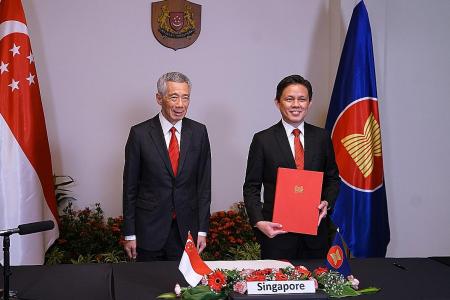Singapore among 15 nations to sign world's largest trade pact
Regional Comprehensive Economic Partnership will facilitate flow of foreign investment, enhance protections
The world's largest trade pact was inked yesterday by ministers from 15 countries including Singapore, in a move likely to spur the region's economy as it battles its worst crisis in decades.
Building on existing free trade deals among members, the Regional Comprehensive Economic Partnership (RCEP) will broaden and deepen economic linkages across Asia-Pacific, ease trade in goods and services, facilitate flow of foreign investments, and enhance protections in areas such as e-commerce.
RCEP members account for 30 per cent of the world's economy and one-third of its population. They comprise all 10 Asean members and key partners Australia, China, Japan, South Korea and New Zealand.
At a leaders' summit yesterday, Prime Minister Lee Hsien Loong described the signing as a "major step forward for the world, at a time when multilateralism is losing ground, and global growth is slowing".
"It signals our collective commitment to maintaining open and connected supply chains, and to promoting freer trade and closer interdependence especially in the face of Covid-19 when countries are turning inwards and are under protectionist pressures," he said.
The pact also gives its members larger stakes in each other's success and prosperity, while helping to strengthen regional peace and security, he added.
PM Lee joined several leaders in expressing the hope that India will be able to sign on in future, so "participation in the RCEP will fully reflect the emerging patterns of integration and regional cooperation in Asia".
New Delhi pulled out of talks in November last year after seven years of negotiations following concerns over trade imbalances. Yesterday, the RCEP leaders reiterated that the door remains open for India.
Some have raised concerns that China stands to benefit the most as the group's largest economy, but ministers noted that the RCEP gives members' businesses greater access to the vast Chinese market. The pact will enter into force once six Asean countries and three partners have ratified it. RCEP leaders said they will expedite domestic processes to ratify the pact.
It will eliminate tariffs for at least 92 per cent of goods, with additional preferential market access for exports. The flow of goods will also be faster.
More companies will be able to provide services in the region, with foreign shareholding limits raised for at least 50 sub-sectors including professional services, telecommunications and financial services. Businesses will find it easier to navigate and integrate into regional value chains.
FOR MORE, READ THE STRAITS TIMES
Get The New Paper on your phone with the free TNP app. Download from the Apple App Store or Google Play Store now



